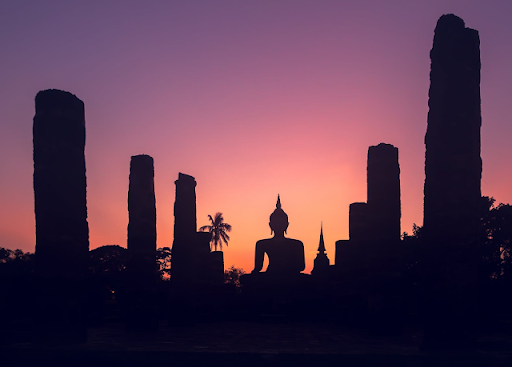Ignorance is the Cause of Conflict and War...
Truth and Wisdom from Thich Nhat Hahn.
A traditional Vietnamese Zen garden is very different from a Japanese Zen garden. Our Zen gardens, called hon non bo, are wild and exuberant, more playful than the formal Japanese gardens with their restrained patterns. Vietnamese Zen gardens are seriously unserious. For us, the whole world is contained in this peaceful place. All activities of life unfold in true peace in the garden: in one part, children will be playing, and in another part, some elderly men will be having a chess game; couples are walking; families are having picnics; animals are free to wander around. Beautiful trees are growing next to abundant grasses and flowers. There is water, and there are rock formations. All ecologies are represented in this one microecology without discrimination. It is a miniature, peaceful world. It is a beautiful living metaphor for what a new global ethic could bring.
War is not a necessary condition of life. The root of war, as with all conflicts, is ignorance, ignorance of the inherent goodness—the buddhanature—in every human being. The potential for ignorance lives in all of us; it gives rise to misunderstanding, which can lead to violent thoughts and behavior. Although ignorance and violence may not have manifested in your life, when conditions are sufficient, they can. This is why we all have to be very careful not to water these seeds and not to allow them to develop roots and grow into arrows.
The Roots of War
When one country attacks another, it is out of great fear and a kind of collective ignorance. For instance, the French fought to keep Vietnam as their colony, because they thought that if they possessed Vietnam, they would be happy. So they sent many young men to Vietnam to kill and to be killed. We know, when we look deeply, that happiness does not come from possessing something or someone; it comes from kindness and compassion, from helping to ease suffering.
If the American people had sat down and practiced looking deeply, they would have seen that the Vietnam War was entirely unnecessary, that their own lives could not be improved through the suffering of another country or the suffering of their own young men. The United States senselessly wasted many lives in this war when it could have supported both North and South Vietnam in their different models of development, helping the Communists and the non-Communists alike to rebuild their societies. This would have been much wiser than supporting one side and fighting the other. If France and the United States had yielded autonomy to Vietnam, Laos, Cambodia and Thailand, helping these countries to develop instead of waging war, all sides would have profited from such a friendly relationship. After a long period of suffering, these countries are finally moving in this direction, but this could have happened much earlier without the terrible loss of life.
All violence is injustice. We should not inflict that injustice on ourselves or on other people. Historians and teachers as well as politicians should look deeply at the suffering caused by wars, not just at the justifications that governments give for them. We have to teach our children the truth about war so they learn from our experiences and understand that violence and war are not the right way, that they are not the right actions to take. We have to show our children that people on both sides of war—the French and American soldiers in Vietnam as well as the Vietnamese people—were victims of the ignorance and violence rooted in their societies and governments. Remember, there were no winners.
As long as we allow hatred to grow in us, we continue to make ourselves and others suffer. As we look deeply at the wars in our recent history, we have to transform our hatred and misunderstanding into compassion. We have to recognize that those who have made us suffer are also victims. Many who had a father, brother or friend killed in the Vietnam War have been able to transcend their suffering and to reconcile with the other side, Vietnamese and American. They have done this for their own sake and for the sake of their children.
How can we as individuals influence the collective consciousness of our nations and move in the direction of peace? We do this by uprooting the roots of violence and war within ourselves. To prevent war, we cultivate nonviolence. We practice mindfulness in our daily life so that we can recognize and transform the poisons within us and our nation. When we practice nonviolence in our daily life, we see the positive effects on our families, society and government.
Peace Is Possible
In the summer of 2001 in our community in Plum Village, France, about eighteen hundred people came and practiced with us. Among them were a few dozen Palestinians and Israelis. We sponsored these people hoping they could have the opportunity to practice walking meditation together, to share a meal together, to listen to the teachings of mindfulness practice and to learn the act of deep listening and gentle, loving speech. The Israelis and Palestinians spent two weeks with us and participated in all activities.
At the end of their stay, the whole community gathered together and our visitors stood up and gave a report. After only two weeks of practice, they had transformed very deeply. They had become a community of brothers and sisters, Palestinians and Israelis. They said to us, “Dear community, dear Thich Nhat Hanh, when we first came to Plum Village we couldn’t believe it. Plum Village did not look real to us because it is so peaceful. In Plum Village, we did not feel the kind of anger, tension and fear that we feel constantly in the Middle East. People look at each other with kind eyes, they speak to each other lovingly. There is peace, there is communication and there is brotherhood and sisterhood.” One member of the delegation said, “We spent two weeks in paradise.” Another person wrote to me after he returned home and said, “This is the first time that I have believed that peace is possible in the Middle East.”
What did we do to make the third truth—that well-being and peace are possible—real to them? Honestly, we did not do much. We just embraced these friends from the Middle East as brothers and sisters. They learned to walk mindfully with us, to breathe in and out mindfully with us, to stop and be there in the present moment with us, and to get in touch with what is pleasant, nourishing and healing around them and within themselves. The practice is very simple, but supported by a practicing sangha, they were able to succeed more quickly than on their own and to touch the peace and happiness within each of them.
Together we all followed the basic practice: to do everything mindfully. We established ourselves in the here and now in order to touch life deeply. We practiced mindfulness while we breathed and walked and talked and brushed our teeth and chopped vegetables for meals and washed dishes. That is the basic daily practice that our friends learned. We in the sangha offered our support, sitting with our visitors and practicing listening with compassion with them.
We trained them to speak in such a way that the other side could hear and understand and accept. They spoke in a calm way, not condemning anyone, not judging anyone. They told the other side of all the suffering that had happened to them and their children, to their societies. They all had the chance to speak of their fear, anger, hatred and despair. Many felt for the first time that they were listened to and that they were being understood, which relieved a lot of suffering within them. We listened deeply, opening our hearts with the intention to help them express and heal themselves.
Two weeks of the practice of deep listening and using loving speech brought a lot of joy to our visitors and to all of us in Plum Village. We were reminded, hearing these stories, that during the Vietnam War, we Vietnamese, too, had suffered terribly. Yet our practice allowed us then and allows us still to see that our world is beautiful, with all the wonders of life available every day. This is why we know that our friends from the Middle East, too, can practice in the middle of war around them.
There were moments during the war when we wished so hard that there would be a cease-fire for just 24 hours. We thought that if we had only 24 hours of peace, we would have been able to breathe in and out and smile to the flowers and the blue sky. But we did manage to breathe in and out and smile, even then, because even the flowers had the courage to bloom in the middle of war. Yet still, we wanted 24 hours of peace during the war. We wanted the bombs to stop falling on us.
During the war in Vietnam, young people came to me and asked, “Do you think there will be an end to the war?” I could not answer them right away. I practiced mindful breathing, in and out. After a long time I looked at them and said, “My dear friends, the Buddha said everything is impermanent, including war.”
Before going back to the Middle East, our friends promised us that they would continue the practice. They told us that on the local level they would organize weekly meetings so they could continue to walk together, sit and breathe together, share a meal together and listen to each other. Every month they have had an event to do this. They practice true peace even in the midst of war.







Comments
Post a Comment
RN USA no longer accepts comments. The information presented is for reflection, contemplation, and for those seeking greater understanding and wisdom. It is for seekers and those with an open mind and heart.
Namaste